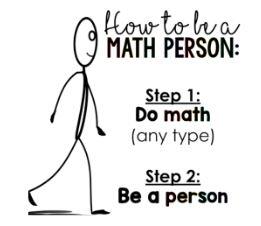Think back to when you went to school….what was maths like for you? Engaging, easy, fun or scary, soul destroying, being right or wrong answers, working through textbooks? Now, what would you like maths to be like for your child?
This semester, teachers will be undertaking professional learning called ‘Big ideas to start strong’, where we will learn about some of the big ideas and core concepts that underpin much of the NSW mathematics syllabus. The above questions are ones that we discussed at length during our staff development day.
One of the key ideas highlighted in our first session was the notion of a ‘math person’ and ‘math anxiety’. The idea of a math person stems from the belief that math intelligence is something we either have or we don’t, rather than something that grows and develops with hard work and opportunities to learn. Math anxiety is the name given to the feeling of being overwhelmed and confused when faced with a mathematical problem. It is estimated to effect up to one third of adults and children.
Whilst our teachers are working in the classroom to inspire all our students to become mathematicians, here are some tips for parents to use at home:
Never share with your children the idea that you were bad at maths at school, or that you dislike maths. Whilst the words ‘I was never any good at maths when I was at school’ may be used to console a child who is struggling with maths, it can make them feel worse about their inability to solve maths problems and ultimately have a long-lasting effect on their numeracy skills.
Always be encouraging and never tell kids they are wrong when they are working on maths problems. Instead find the logic in their thinking – there is always some logic to what they say. For example, if your child multiplies 3 by 4 and gets 7, say – Oh I see what you are thinking, you are using what you know about addition to add 3 and 4, when we multiply, we have 4 groups of 3…
Never associate maths with speed. It is not important to work quickly, and we now know that forcing kids to work quickly on maths is the best way to start maths anxiety for children, especially girls.
Encourage a ‘growth mindset’ let students know that they have unlimited maths potential and that being good at maths is all about working hard. When children have a growth mindset, they do well with challenges and do better in school overall. When children have a fixed mindset and they encounter difficult work, they often conclude that they are not ‘a math person’. One way in which parents encourage a fixed mindset is by telling their children they are “smart” when they do something well. That seems like a nice thing to do, but it sets children up for difficulties later, as when kids fail at something they will inevitably conclude that they aren’t smart after all. Instead use growth praise such as “it is great that you have learned that”, “I really like your thinking about that”. When they tell you something is hard for them, or they have made a mistake, tell them: “That’s wonderful, your brain is growing!”
Two websites that are worth checking out:















